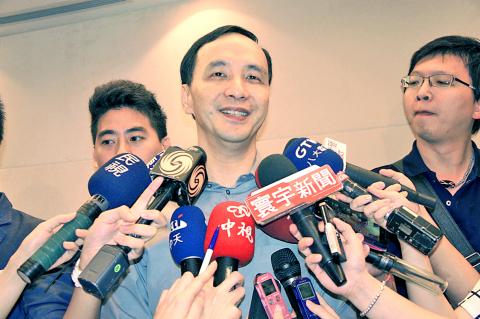New Taipei City Mayor Eric Chu (朱立倫) will run for re-election in the mayoral election in November because he has no other option, Taiwan Solidarity Union (TSU) Secretary-General Lin Chih-chia (林志嘉) — who is also the party’s candidate in the election — told a press conference yesterday.
“I would say [the possibility of Chu running for re-election is] 100 percent. It’s my assessment though — you don’t have to believe me, but time will tell,” Lin said, adding that he had full confidence that he could beat Chu by more than 100,000 votes in the election.
Chu has yet to declare whether he would be running for re-election, fueling speculation that he might decide against doing so and focus on vying for the Chinese Nationalist Party’s (KMT) nomination for the presidential race in 2016.

Photo: Lai Hsiao-tung, Taipei Times
Lin also accused Chu of hushing up his share in a company owned by his father-in-law, Kao Yu-jen (高育仁), worth approximately NT$2 million, on his civil servant’s property declaration in 2010 when he served as vice premier.
Citing information in the annual report of Tai Tung Communication Co, Lin said Chu held 1.05 percent of the company’s shares.
The company, which the Kao family invested in in 2000, had won 160 government bids over the past 14 years, including 47 bids between 2000 and 2001, when Chu was a legislator, on 56 tenders — a 83 percent winning rate, Lin added.
“Chu should offer an explanation, as this is a potential corruption case that involves his integrity,” Lin said.
Chien Sheng-che (簡聖哲), a TSU candidate in the Taipei City council elections, said Chu could have violated the Act on Recusal of Public Servants Due to Conflicts of Interest (公務人員利益衝突迴避法), which prohibits public servants or their families from securing government bids.
According to Chien, Chu had declared the 7.89 percent shareholding of his wife, Kao Wan-chien (高婉倩), in his report in 2010, but left out his own investment in the report.
In response, Chu said yesterday morning before the TSU press conference that the allegation was groundless and was only a campaign activity to boost Lin’s profile.

Alain Robert, known as the "French Spider-Man," praised Alex Honnold as exceptionally well-prepared after the US climber completed a free solo ascent of Taipei 101 yesterday. Robert said Honnold's ascent of the 508m-tall skyscraper in just more than one-and-a-half hours without using safety ropes or equipment was a remarkable achievement. "This is my life," he said in an interview conducted in French, adding that he liked the feeling of being "on the edge of danger." The 63-year-old Frenchman climbed Taipei 101 using ropes in December 2004, taking about four hours to reach the top. On a one-to-10 scale of difficulty, Robert said Taipei 101

Nipah virus infection is to be officially listed as a category 5 notifiable infectious disease in Taiwan in March, while clinical treatment guidelines are being formulated, the Centers for Disease Control (CDC) said yesterday. With Nipah infections being reported in other countries and considering its relatively high fatality rate, the centers on Jan. 16 announced that it would be listed as a notifiable infectious disease to bolster the nation’s systematic early warning system and increase public awareness, the CDC said. Bangladesh reported four fatal cases last year in separate districts, with three linked to raw date palm sap consumption, CDC Epidemic Intelligence

Two Taiwanese prosecutors were questioned by Chinese security personnel at their hotel during a trip to China’s Henan Province this month, the Mainland Affairs Council (MAC) said yesterday. The officers had personal information on the prosecutors, including “when they were assigned to their posts, their work locations and job titles,” MAC Deputy Minister and spokesman Liang Wen-chieh (梁文傑) said. On top of asking about their agencies and positions, the officers also questioned the prosecutors about the Cross-Strait Joint Crime-Fighting and Judicial Mutual Assistance Agreement, a pact that serves as the framework for Taiwan-China cooperation on combating crime and providing judicial assistance, Liang

US climber Alex Honnold left Taiwan this morning a day after completing a free-solo ascent of Taipei 101, a feat that drew cheers from onlookers and gained widespread international attention. Honnold yesterday scaled the 101-story skyscraper without a rope or safety harness. The climb — the highest urban free-solo ascent ever attempted — took just more than 90 minutes and was streamed live on Netflix. It was covered by major international news outlets including CNN, the New York Times, the Guardian and the Wall Street Journal. As Honnold prepared to leave Taiwan today, he attracted a crowd when he and his wife, Sanni,